Description
LEARNING UNIT 1: INTRODUCTION TO COMMUNICATION
1.1 For the purpose of this module, we define communication as “the sharing of meaning from
one entity to another”. With this definition in mind, discuss the African perspective of
communication. Include examples of types of communication illustrating the African
perspective of communication. (3)
1.2 Read the scenario below before you answer this question: Lucy was running late to an important meeting and needed to inform her colleague, Thabo,
right away. She quickly dialled his number and spoke into her phone, hoping he would
understand her situation. Though her voice was clear at the start, the noisy construction
equipment outside her office caused her words to sound slightly muffled. Thabo strained to
listen, piecing together what Lucy was saying about running late and proposing a new meeting
time. After catching most of her hurried explanation, he responded with a quick, “Got it—
thanks for the heads up!” Hearing this reply made Lucy breathe a sigh of relief, knowing her
message had got through despite the interference. The Shannon-Weaver model of communication is based on the idea that communication is a
process of transmitting information from a sender to a receiver through a channel. This model
consists of seven basic elements. Identify and explain the seven elements as depicted in the
scenario. (7)
[Total 10]
LEARNING UNIT 3: COMMUNICATION THEORIES
A theory is defined as a rational type of abstract thinking about a phenomenon, or the results of
such thinking. The process of contemplative and rational thinking is often associated with
processes such as observational study.
2.1 Define agenda-setting theory (5), then explain the two distinct levels of agenda-setting
theory (5).
2.2 In two sentences, what do we mean we talk about DE-CENTRING AND RE-CENTRING?
(3)
2.3 What is your understanding of indigenous knowledge systems (IKS)? Give examples of IKS
from your childhood experiences. (7)
[Total 20]
LEARNING UNIT 5: COMMUNICATION BARRIERS
3.1 What do intergenerational trauma barriers refer to? (2)
3.2 Read the scenario below to answer this question:
During a morning strategy meeting at Redwood Marketing, Sarah presented her proposal
for a client’s new campaign. Moments after she began, loud drilling from a neighbouring
construction site overwhelmed the conference room, making it difficult for anyone to hear
her clearly. As she tried to project her voice above the noise, Sarah’s slides were filled with
technical jargon that some colleagues found unfamiliar, leaving them confused about her
core ideas. Meanwhile, Mr Mashele, one of the managers, had been suffering from a bad
cold for days; his congested ears made it hard to pick up what Sarah was saying, and his
low energy prevented him from asking clarifying questions. On top of that, Ms Ramirez, the
team leader, was feeling uneasy about the looming project deadline and doubted whether
Sarah’s plan would be effective at all. These conflicting emotions caused Ms Ramirez to
interpret Sarah’s presentation defensively, further compounding the group’s
misunderstanding. By the end of the meeting, several key points of the proposal had been
lost, overshadowed by the noise, the technical language, physical discomfort and lingering
apprehensions in the room.
Identify and explain four types of barriers to communication depicted in the scenario. Also
indicate how these barriers can be overcome. (8)
[Total 10]

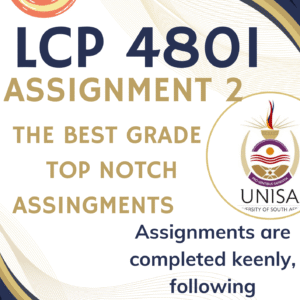

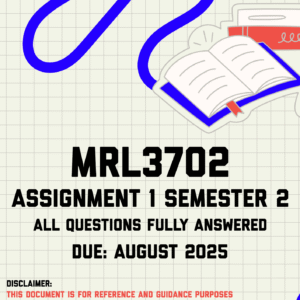


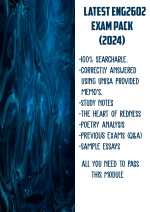







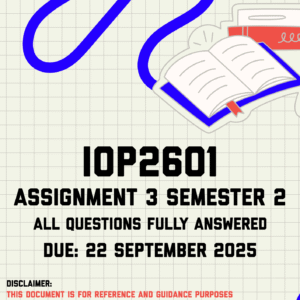
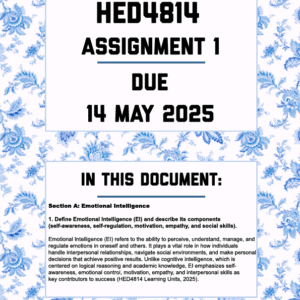
![PYC2601-Multiple Choice (Questions & Answers) [2023]](https://studypass.co.za/wp-content/uploads/2022/12/1-23-300x300.png)







![TLI4801 Assignment 1 Semester 2 2024 Answers [Due Date 19 August 2024]](https://studypass.co.za/wp-content/uploads/2024/08/tli4801-300x300.jpg)

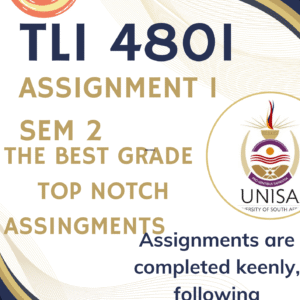


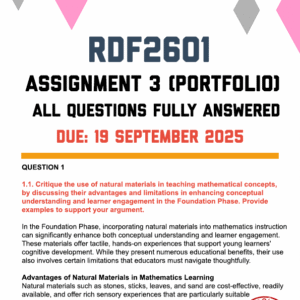

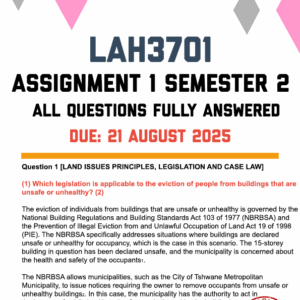



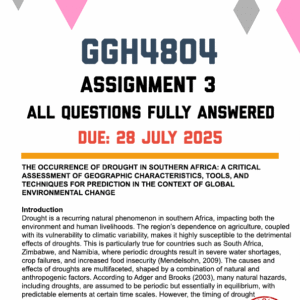




Reviews
There are no reviews yet.